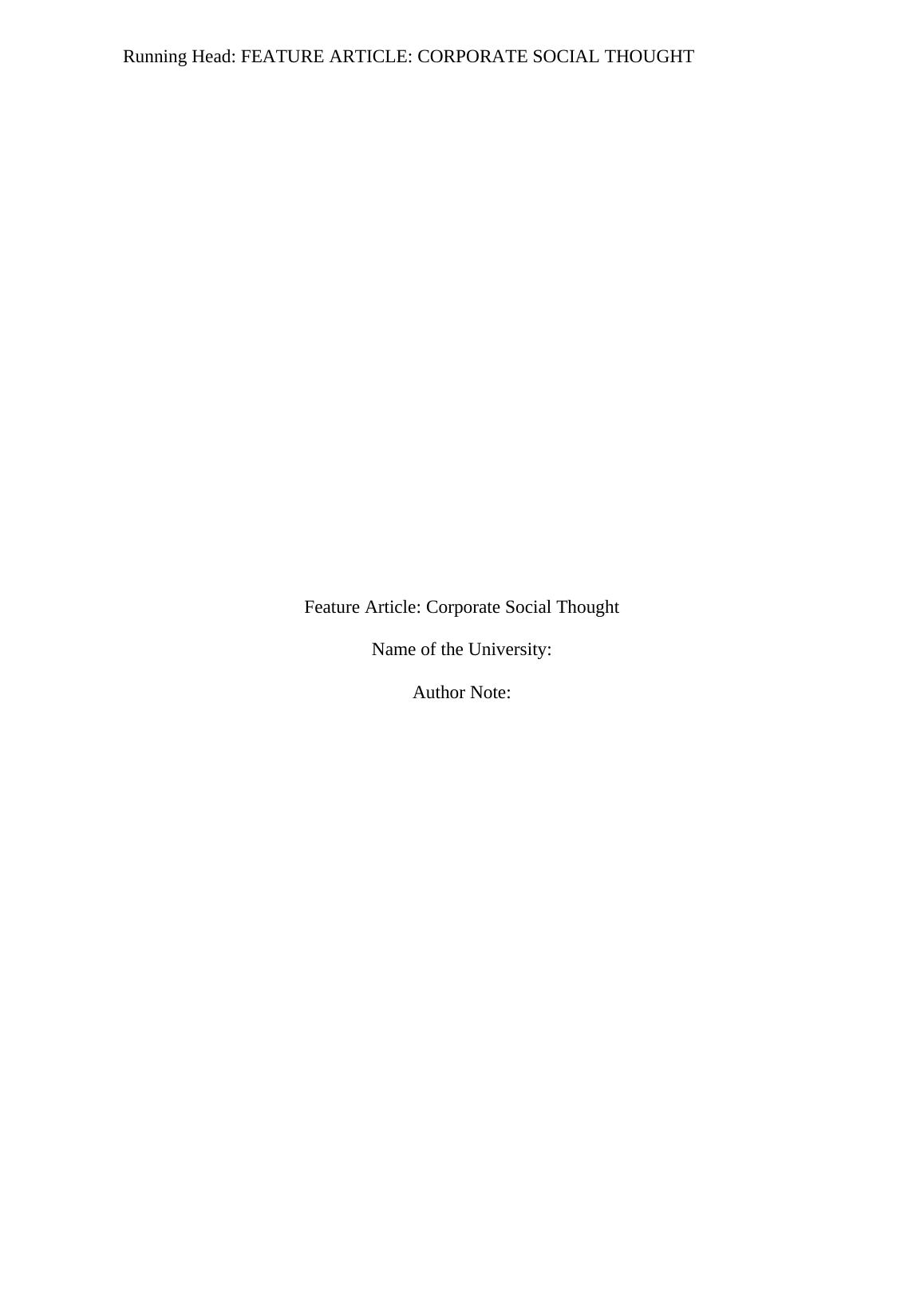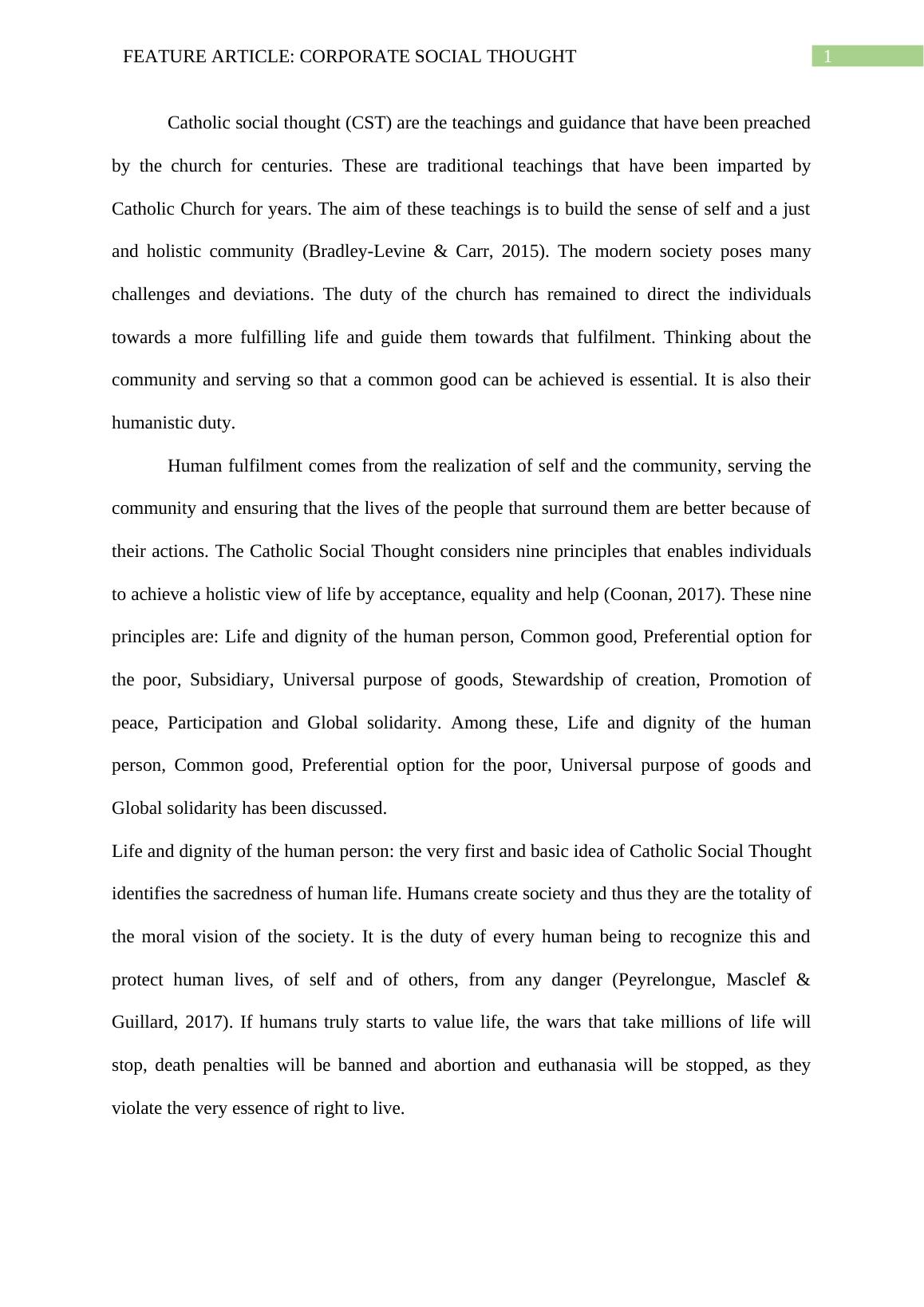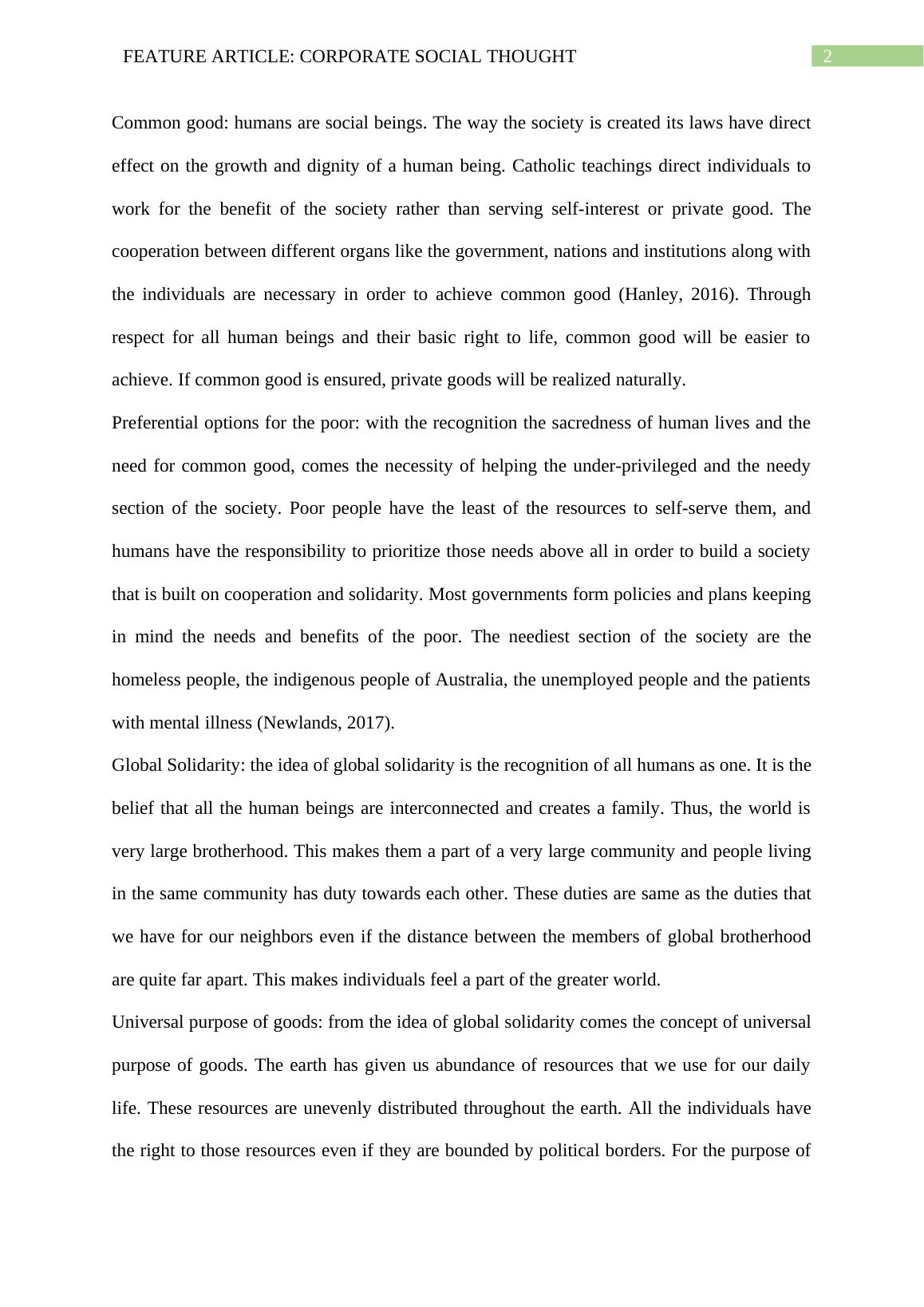Qualitative and Quantitative Methods in Libraries
Added on 2022-09-18
6 Pages1745 Words15 Views
Running Head: FEATURE ARTICLE: CORPORATE SOCIAL THOUGHT
Feature Article: Corporate Social Thought
Name of the University:
Author Note:
Feature Article: Corporate Social Thought
Name of the University:
Author Note:

FEATURE ARTICLE: CORPORATE SOCIAL THOUGHT1
Catholic social thought (CST) are the teachings and guidance that have been preached
by the church for centuries. These are traditional teachings that have been imparted by
Catholic Church for years. The aim of these teachings is to build the sense of self and a just
and holistic community (Bradley-Levine & Carr, 2015). The modern society poses many
challenges and deviations. The duty of the church has remained to direct the individuals
towards a more fulfilling life and guide them towards that fulfilment. Thinking about the
community and serving so that a common good can be achieved is essential. It is also their
humanistic duty.
Human fulfilment comes from the realization of self and the community, serving the
community and ensuring that the lives of the people that surround them are better because of
their actions. The Catholic Social Thought considers nine principles that enables individuals
to achieve a holistic view of life by acceptance, equality and help (Coonan, 2017). These nine
principles are: Life and dignity of the human person, Common good, Preferential option for
the poor, Subsidiary, Universal purpose of goods, Stewardship of creation, Promotion of
peace, Participation and Global solidarity. Among these, Life and dignity of the human
person, Common good, Preferential option for the poor, Universal purpose of goods and
Global solidarity has been discussed.
Life and dignity of the human person: the very first and basic idea of Catholic Social Thought
identifies the sacredness of human life. Humans create society and thus they are the totality of
the moral vision of the society. It is the duty of every human being to recognize this and
protect human lives, of self and of others, from any danger (Peyrelongue, Masclef &
Guillard, 2017). If humans truly starts to value life, the wars that take millions of life will
stop, death penalties will be banned and abortion and euthanasia will be stopped, as they
violate the very essence of right to live.
Catholic social thought (CST) are the teachings and guidance that have been preached
by the church for centuries. These are traditional teachings that have been imparted by
Catholic Church for years. The aim of these teachings is to build the sense of self and a just
and holistic community (Bradley-Levine & Carr, 2015). The modern society poses many
challenges and deviations. The duty of the church has remained to direct the individuals
towards a more fulfilling life and guide them towards that fulfilment. Thinking about the
community and serving so that a common good can be achieved is essential. It is also their
humanistic duty.
Human fulfilment comes from the realization of self and the community, serving the
community and ensuring that the lives of the people that surround them are better because of
their actions. The Catholic Social Thought considers nine principles that enables individuals
to achieve a holistic view of life by acceptance, equality and help (Coonan, 2017). These nine
principles are: Life and dignity of the human person, Common good, Preferential option for
the poor, Subsidiary, Universal purpose of goods, Stewardship of creation, Promotion of
peace, Participation and Global solidarity. Among these, Life and dignity of the human
person, Common good, Preferential option for the poor, Universal purpose of goods and
Global solidarity has been discussed.
Life and dignity of the human person: the very first and basic idea of Catholic Social Thought
identifies the sacredness of human life. Humans create society and thus they are the totality of
the moral vision of the society. It is the duty of every human being to recognize this and
protect human lives, of self and of others, from any danger (Peyrelongue, Masclef &
Guillard, 2017). If humans truly starts to value life, the wars that take millions of life will
stop, death penalties will be banned and abortion and euthanasia will be stopped, as they
violate the very essence of right to live.

FEATURE ARTICLE: CORPORATE SOCIAL THOUGHT2
Common good: humans are social beings. The way the society is created its laws have direct
effect on the growth and dignity of a human being. Catholic teachings direct individuals to
work for the benefit of the society rather than serving self-interest or private good. The
cooperation between different organs like the government, nations and institutions along with
the individuals are necessary in order to achieve common good (Hanley, 2016). Through
respect for all human beings and their basic right to life, common good will be easier to
achieve. If common good is ensured, private goods will be realized naturally.
Preferential options for the poor: with the recognition the sacredness of human lives and the
need for common good, comes the necessity of helping the under-privileged and the needy
section of the society. Poor people have the least of the resources to self-serve them, and
humans have the responsibility to prioritize those needs above all in order to build a society
that is built on cooperation and solidarity. Most governments form policies and plans keeping
in mind the needs and benefits of the poor. The neediest section of the society are the
homeless people, the indigenous people of Australia, the unemployed people and the patients
with mental illness (Newlands, 2017).
Global Solidarity: the idea of global solidarity is the recognition of all humans as one. It is the
belief that all the human beings are interconnected and creates a family. Thus, the world is
very large brotherhood. This makes them a part of a very large community and people living
in the same community has duty towards each other. These duties are same as the duties that
we have for our neighbors even if the distance between the members of global brotherhood
are quite far apart. This makes individuals feel a part of the greater world.
Universal purpose of goods: from the idea of global solidarity comes the concept of universal
purpose of goods. The earth has given us abundance of resources that we use for our daily
life. These resources are unevenly distributed throughout the earth. All the individuals have
the right to those resources even if they are bounded by political borders. For the purpose of
Common good: humans are social beings. The way the society is created its laws have direct
effect on the growth and dignity of a human being. Catholic teachings direct individuals to
work for the benefit of the society rather than serving self-interest or private good. The
cooperation between different organs like the government, nations and institutions along with
the individuals are necessary in order to achieve common good (Hanley, 2016). Through
respect for all human beings and their basic right to life, common good will be easier to
achieve. If common good is ensured, private goods will be realized naturally.
Preferential options for the poor: with the recognition the sacredness of human lives and the
need for common good, comes the necessity of helping the under-privileged and the needy
section of the society. Poor people have the least of the resources to self-serve them, and
humans have the responsibility to prioritize those needs above all in order to build a society
that is built on cooperation and solidarity. Most governments form policies and plans keeping
in mind the needs and benefits of the poor. The neediest section of the society are the
homeless people, the indigenous people of Australia, the unemployed people and the patients
with mental illness (Newlands, 2017).
Global Solidarity: the idea of global solidarity is the recognition of all humans as one. It is the
belief that all the human beings are interconnected and creates a family. Thus, the world is
very large brotherhood. This makes them a part of a very large community and people living
in the same community has duty towards each other. These duties are same as the duties that
we have for our neighbors even if the distance between the members of global brotherhood
are quite far apart. This makes individuals feel a part of the greater world.
Universal purpose of goods: from the idea of global solidarity comes the concept of universal
purpose of goods. The earth has given us abundance of resources that we use for our daily
life. These resources are unevenly distributed throughout the earth. All the individuals have
the right to those resources even if they are bounded by political borders. For the purpose of

End of preview
Want to access all the pages? Upload your documents or become a member.
Related Documents
Interrelationship of Self and Community in Catholic Social Teachinglg...
|6
|1314
|129
Catholic Social Thought | Assignmentlg...
|7
|1744
|67
Feature Article: Corporate Social Thoughtlg...
|6
|1679
|13
Principles of the Catholic Social Thought Article 2022lg...
|6
|1360
|25
Catholic Social Teaching | Reportlg...
|9
|1597
|14
Catholic Social Thought: Principles and Their Significancelg...
|6
|1137
|158
